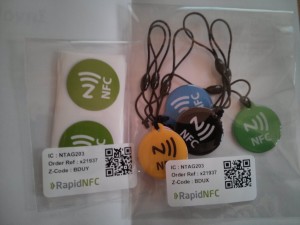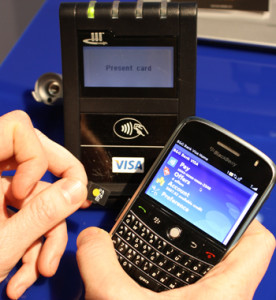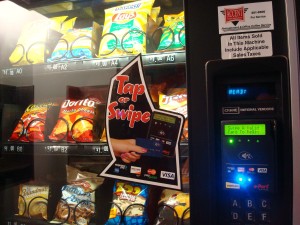May 29th, 2014 by Elma Jane
A point-of-sale facial recognition system that uses NFC to help combat card fraud has been created during a recent company hack-a-thon, together with a group of engineers and designers from Logic PD. Hackathon was an opportunity for experts to explore the possibilities of useful solutions to today’s challenges, with the recent significant breaches in security at leading retailers, the need for this type of solution is particularly meaningful.
The solution, is a multi-modal security platform for card purchases, uses NFC authentication combined with camera imaging to protect users. When users make a mobile payment at the point of sale, the kiosk snaps a picture of the purchaser. This image can be incorporated via the cloud into the user’s digital transactional record, which was stored and distributed via SeeControl in this example, allowing users to identify who made each purchase, and easily identify those that are fraudulent even before banks and financial institutions.
Posted in Credit Card Security, Mobile Payments, Mobile Point of Sale, Point of Sale, Smartphone Tagged with: banks, breaches, card, card fraud, card purchases, cloud, digital, facial recognition system, financial institutions, mobile payment, nfc, NFC authentication, platform, point of sale, retailers, Security, security platform
April 15th, 2014 by Elma Jane
Amsterdam, Netherlands-based Cardis has been piloting its technology in Europe with Raiffeisen Bank in Austria and Sberbank in Russia. They are now focused on the U.S., as this is the fastest growing mobile payments market in the world, where there’s a huge opportunity. Integration of technology with a large U.S. processor and with a major U.S. retail brand, which will be launching a mobile site and mobile app using Cardis solution.
Cardis International is planning an April launch in the U.S. for its technology, which enables merchants to accept low-value contactless or mobile payments without incurring high processing charges. Cardis is able to bring down the processing cost of low-value payments, the company said, by aggregating multiple transactions into a single payment.
The problem
Contactless card and NFC-based mobile payments are typically for low amounts, and yet still use a card processing infrastructure that was designed 40 years ago when the average credit card transaction was $100.
Traditional card processing systems require each transaction to be individually processed through the payment system, including authorization, clearing and settlement. The resulting variable costs of processing each transaction are independent of the transaction amount and too high for low-value payments, particularly in low-margin industries such as quick-service restaurants. QSR restaurants often have a 3 percent profit margin, yet, for low-value contactless payments, the processing cost could be as high as 6-7 percent of the transaction value.
Mobile and contactless cards offer consumers a convenient form factor. But they don’t solve the problem that low-value card payments are very expensive for merchants.
As an ever-increasing percentage of transactions have become cashless, card processing fees have become a significant cost. Costs that are based on the number of transactions, rather than their value. With average per person expenditures of $5 or under, feels each swipe fee much more than a business where customers spend $50 or more. But not accepting credit/debit cards for low-value transactions isn’t an option as many of customers don’t carry cash anymore.
Aggregation
Cardis’ solution is to act as an aggregator of low-value payments, sending a single batched transaction through to a processor instead of multiple low-value transactions. As there is no per transaction processing of individual low-value purchases, the cost-per-transaction is significantly reduced.
Cardis provides its technology as a software plug-in to payment service providers for contact-based and contactless card payments, mobile wallet transactions and NFC payments.
There are two models. For card payments, it will aggregate multiple purchases by an individual cardholder at a single merchant on a post-paid basis up to a specific amount, for example $20. To guarantee payment to the merchant, since the aggregated transaction is processed at a later date, it will pre-authorize an amount, for example $15, the first time the customer makes a purchase at that merchant.
Alternatively, merchants can opt for Cardis’ prepaid system. This involves the consumer setting up a prepaid account hosted by Cardis’ sponsoring bank that is topped up via ACH (automated clearing house) transfers. Using the Cardis prepaid account on a smartphone provides the digital equivalent to cash.
With its post-paid solution, merchants will save 30-50 percent per transaction compared to conventional card processing fees, while its prepaid solution saves merchants 80 percent per transaction. With the post-paid solution, it will only aggregate a customer’s purchases at a single specific merchant. But, as the prepaid solution aggregates the customer’s purchases across multiple merchants, this enables to offer a much lower processing fee to the merchant.
Cardis provides an audit trail enabling consumers to track individual transactions that are aggregated using its technology. Consumers don’t lose any of their card protection rights and guarantees by agreeing to let a merchant aggregate their payments through Cardis. They can always charge back any disputed transactions.
Cardis sees opportunities for digital content providers such as online music stores and games providers to use its aggregation technology. It can integrate solution with existing digital wallets.
Raiffeisen
In 2012, Austria’s Raiffeisen Bank launched a pilot of Cardis technology for NFC-based Visa V Pay debit card payments in partnership with Visa Europe. Raiffeisen’s MobileCard mobile payment product uses a secure element stored on an NFC-enabled MicroSD card inserted in a mobile phone. Although Cardis supports secure elements stored on SIM cards as well as on MicroSD cards and on the cloud, Raiffeisen opted for MicroSD cards, as this is an easier solution to implement.
Raiffeisen cardholders participating in the pilot use MobileCard on average three times a week, with an average transaction value of ($5.70). Merchants accepting MobileCard are seeing 40 percent to 70 percent lower merchant processing fees for an average transaction value of ($5.43) to ($13.60).
Spindle
In October 2013, Spindle, a U.S. mobile commerce company, signed an agreement with Multi-max, a manufacturer of vending machines for mid-size and small offices throughout North America, Europe and Asia. Spindle will integrate its MeNetwork mobile commerce technology into Multi-max’s line of K-Cup vending machines for rollout across the U.S.
The MeNetwork solution will incorporate all card-based payment acceptance services, as well as mobile marketing services. Spindle’s partner Cardis will provide low-value payment processing services for purchases at K-Cup vending machines.
Posted in Credit card Processing, Credit Card Security, Digital Wallet Privacy, e-commerce & m-commerce, Electronic Payments, Gift & Loyalty Card Processing, Internet Payment Gateway, Mobile Payments, Mobile Point of Sale, Near Field Communication, Payment Card Industry PCI Security, Smartphone, smartSD Cards, Visa MasterCard American Express Tagged with: accept, ach, aggregated, aggregation, aggregator, authorization, automated clearing house, average transaction, batched, card payments, card processing infrastructure, card processing systems, card-based payment acceptance, cardholders, clearing, contactless, contactless payments, cost-per-transaction, credit card transaction, debit card payments, Digital wallets, high processing charges, low-value payments, merchant aggregate, Merchant's, microSD, mobile app, mobile commerce, mobile payment, Mobile Payments, mobile site, mobile wallet transactions, nfc-based, payment service providers, pre-authorize, prepaid, processed, Processing, processing cost, processing fees, processor, settlement, smartphone, transactions, transfers
August 16th, 2013 by Admin
Facebook is doing early testing of a payment system to store credit card data and processes transactions through PayPal or other merchant service providers including Stripe or Braintree. Facebook would store credit card data for use in purchases in Facebook Gifts and games played on Facebook. The thought behind the move being that it makes it easier for people to make mobile transactions on third party apps giving strength to their advertising platform.
In a statement, Facebook said…
“We are working on a very small test that gives people the option to use their payment information already stored on Facebook to populate the payment form when they make a purchase in a mobile app. The app then processes and completes the payment. The test is designed to make it easier and faster for people to make a purchase in a mobile app by simply pre-populating your payment information. It will be a very small test with 1-2 partners. Additionally, this test does not involve moving the payment processing away from an app’s current payments provider, such as Paypal. We continue to have a great relationship with our payment processing partners, and this product is simply to test how we can help apps provide a simpler commerce experience.”
This marks a bold move whether or not Facebook is actually conducting the transaction itself. Higher conversion rates on their advertising for app developers and advertisers. Mobile Wallets have a proven success for the likes of Amazon, Apple and Google where repeat transactions are the norm. The move could signal that Facebook is looking to move further into e-commerce and digital transaction payments and to buy or build their own payment processing division. It’s also a signal that digital identity and verification could be on the horizon.
Combined with the data Facebook already knows about its users, the company could store things like clothing sizes, shoe sizes, travel itineraries, music or event preferences and much more. This could be a catalyst to send that data automatically to vendors at the point of sale. Things like email addresses are already shared to third party apps if you allow them to. Loyalty rewards might be offered to users to allow the data to be shared with vendors for deeper demographic information.
In addition to mobile payments, Facebook has experimented with virtual currency transactions with its Facebook Credits initiative. They exited the strategy because mostly because developers moved to other virtual currencies like BitCoin and LiteCoin. Recently Facebook Gifts lets users send one another physical gifts and presents a gift suggestion when it notifies users of a birthday. Pulling down the barrier and simplifying a complicated transaction could make it a boon to retailers looking toward mobile payment processing.
Posted in Digital Wallet Privacy, Electronic Payments, Mobile Payments, Mobile Point of Sale Tagged with: digital, electronic, Faceboo, mobile payment, mobile wallet, PayPal, Stripe



